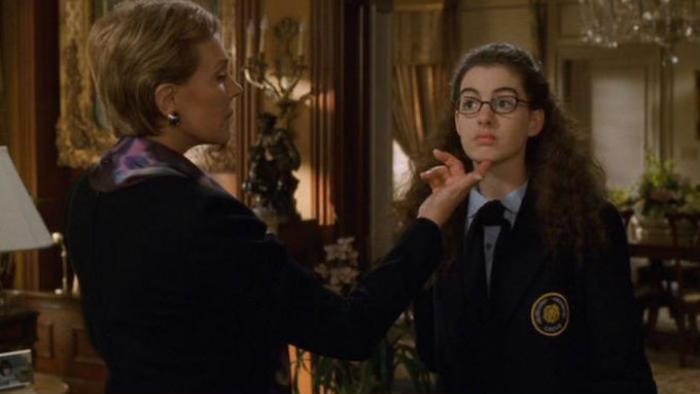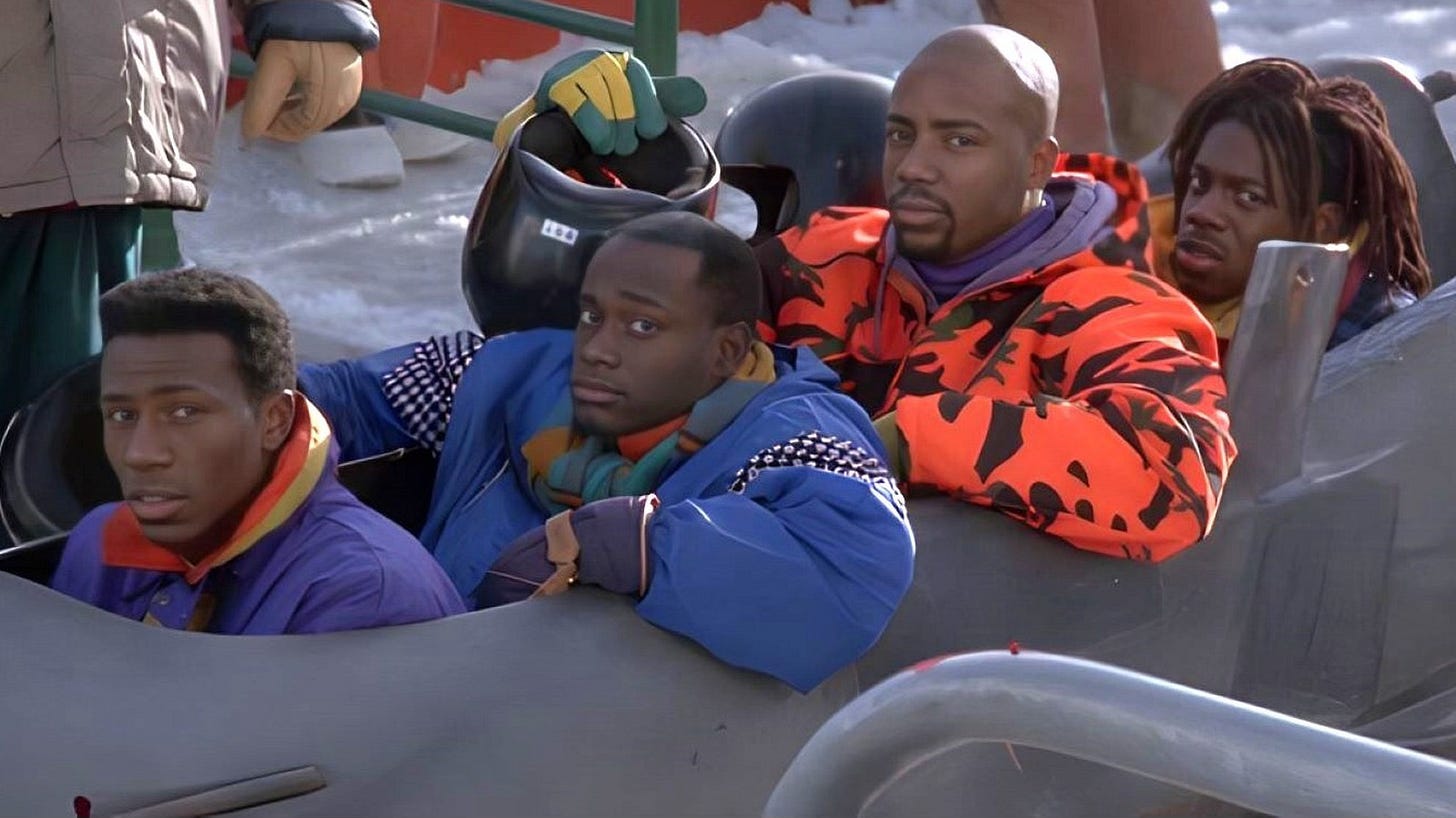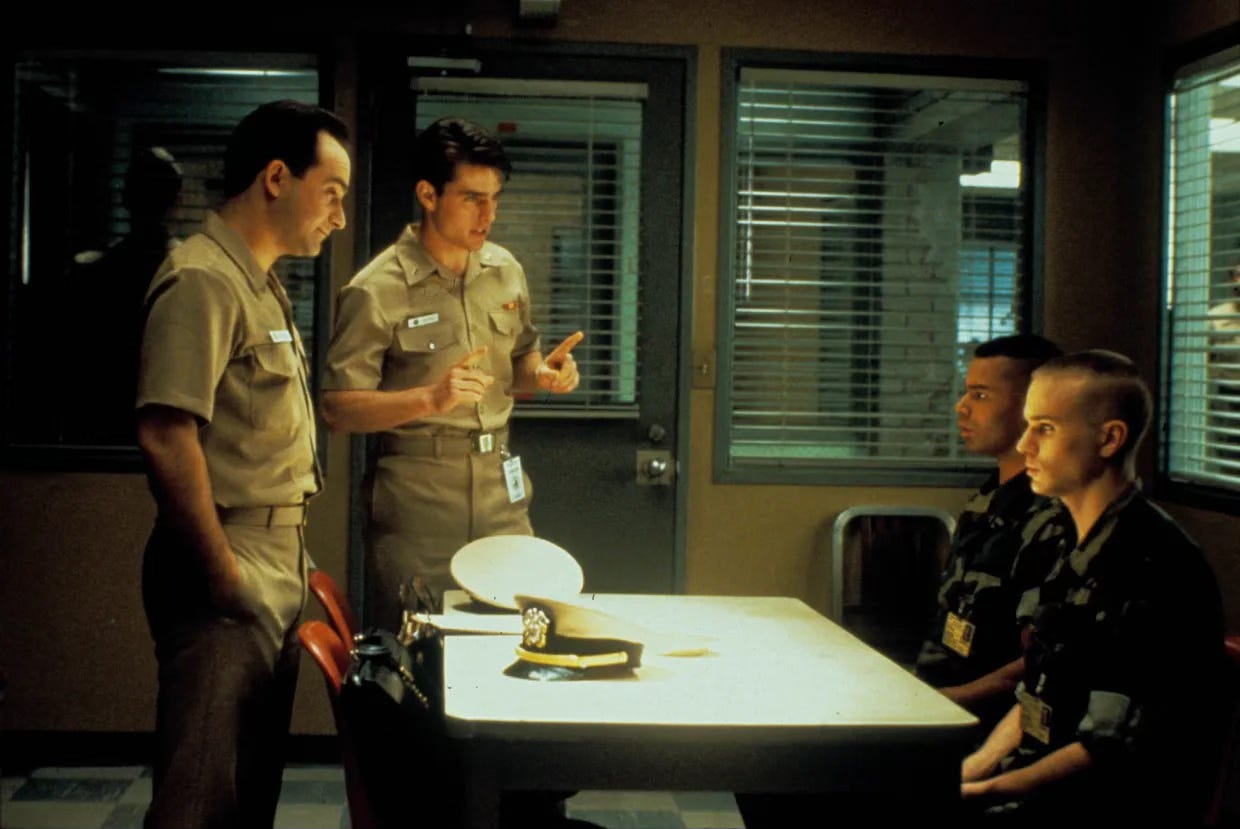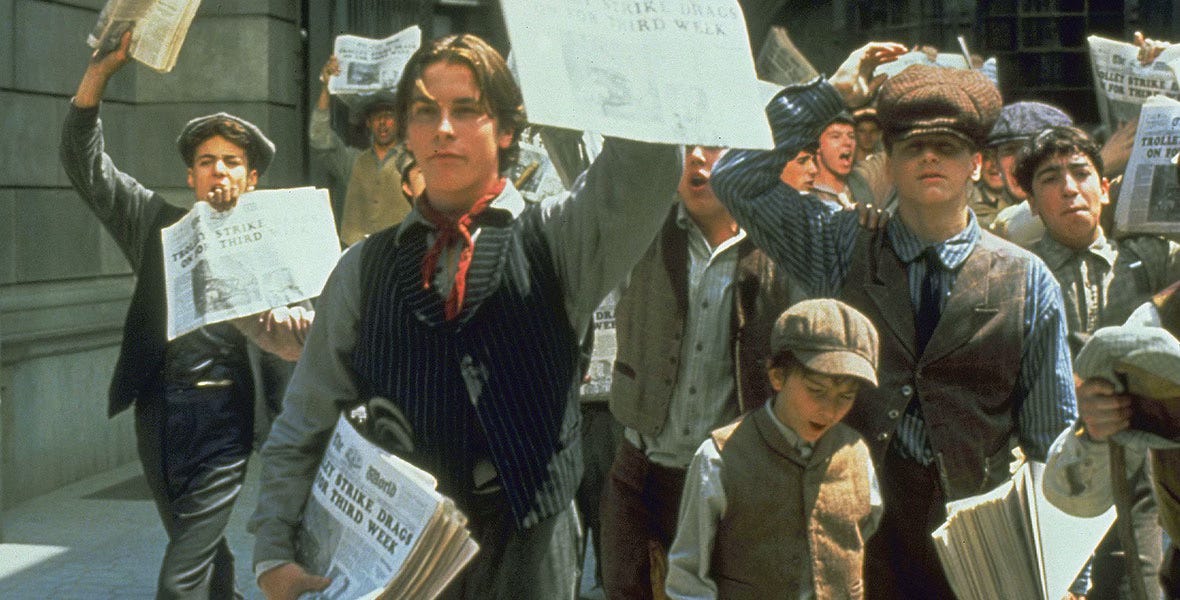Don't Sell Out
How to Preserve the Soul of Your Work While Still Being Successful at Marketing
Happy Monday, y’all!
I had the privilege of connecting with Brady Hill this week, who mentioned the struggle of not trading in your authenticity as a creative for whatever will get clicks in our attention-based industry. That conversation inspired me to reflect on some of my favorite movies that remind me to stay true to my own style, even when it makes me feel like I’m shouting into a void, hoping against all logic that it will somehow change the world for the better. Thus, this article was born.
Also, I naturally had to stay awake until 2am re-watching Newsies for the umpteenth time because that film invigorates my soul so freaking much. Please do yourself a favor and watch this movie—I need more people to scream “The World Will Know” with me on random work days.
Cheers,
Ceylan Gunduz (OBA Studio’s Newsletter editor-in-chief)
Don’t Sell Out: Where the Line Between Art and Content Lies
“Everyone hates a sellout.”
“Man, they used to be good…but then they sold out.”
“Selling out” is a term given to creators who change their personal style to appeal to a wider audience or make more money. The term is often used to call someone out for being fake. For example, letting popular trends guide your platform rather than your own genuine beliefs.
Do you struggle with the tension between making a living creating art and being an artist? If our creations are our livelihood, then we have to make a living from them. This means marketing effectively enough to pay the bills, which means playing by the rules of the almighty algorithm.
Being in the business of art means that we have to create work that is acceptable to the masses, even if we’re not passionate about what we have made. Right?
Wrong. Kind of. Yes, the cardinal rule of effective marketing is that we need to put out what our audience responds to. Some people gauge that response by how many views, clicks, and likes their projects get. (Spoiler alert: these are called “vanity metrics” for a reason.)
Apparently, the choice set before us creators today is to either fail or to sell our souls to the will of the evil algorithms, being parrots of the “health and wealth gospel” that every entrepreneur with over 100K followers is preaching nowadays.
“I gained 1,000 followers in one month. Here’s how you can, too.”
“Follow these simple steps to make $6,000 every month.”
“I quit my day job at age 27 and you can, too.”
These viral headlines appeal to all of us because we want to be given the assurance that we can be successful. But what does true success mean?
Is true success measured in dollars? Followers? Views? Clicks? Even likes? Or is true success measured in moments–threads, even flickers, of genuine connection with another human who feels the truth of your story deeply?
How do YOU want your audience to respond to your story? Are you looking for genuine connection, or a wide impression? Do you want to grab a few people by the heart and change their lives, or do you want to have high numbers on your analytics page?
Sometimes the truth demands to be told, even if it’s unpopular. Sometimes, a story needs to be told because it’s important, not because it’s sensational enough to go viral.
Not sure how to be successful as a creative without pandering to the heartless masses or being labeled a sell-out? The answer, of course, can be found through story. These 5 films share stories that serve as great examples of how we can tap into our true strength to preserve our values against the rat race that attempts to grind us into the dirt.
Newsies
This movie has a mixed reputation. On one hand, it was a box office fail upon its release and many critics say the film is horrible. On the other hand, this musical directed by Kenny Ortega eventually gained a cult of fans which I am a diehard member of (sorry, not sorry). No matter how you will feel about Newsies, go watch this movie if you haven't already. You’ll laugh, cry, and sing along. You may even join my opinion that Christian Bale as Jack Kelly slaps harder than Batman (again, I am not apologizing).
The amazing thing about the human experience is that the feelings we struggle with have been struggles since the beginning of time. As Jack says to his fellow newsboys, or “newsies,” when the newspaper tycoons in 1899 price gouge the orphans who sell their papers: “I mean, Pulitzer and Hearst and all them other rich fellas…they own this city. So do we really think a bunch of street rats like us can make any difference? I mean, the choice has gotta be yours. Are we just gonna take what they give us, or are we gonna strike?”
After the newsies decide to strike, they get beaten down (literally) again and again. Jack is ready to throw in the towel. He recognizes the newsies are impossibly outmatched going up against the newspaper corporations: the largest power to exist in the world at the time. Have you ever felt the same? Like we can either play their game and survive, or we can die penniless and kicking rocks, screaming for a cause that no one else seems to care about.
But then, a reporter named Denton confides that the rich fellas in the city are actually terrified of the newsies, afraid that their strike against unfair child labor will spread. Jack argues back, “There’s really not much chance of that as long as they got all the power.”
Denton wisely replies, “Sometimes, all it takes is a voice. One voice, that becomes a hundred. And then a thousand…unless it’s silenced.”
If you feel like you are screaming into the void, fighting an impossible power: keep speaking the truth. Your perspective is valid and powerful. No matter how alone you feel, chances are you just haven’t yet found the others who are experiencing the same problems you are. But once they DO find your story, they’ll be able to say “Hey, I’m not alone!” As long as our stories are buried under our fear or discouragement of speaking up, our true power for change is smothered.
Don’t follow the crowd. Speak the truth and create your own crowd.
(Oh, and I WILL be referencing this film again in future articles. Because Newsies is incredible. So you might as well go watch it so you know what I’m talking about the next time I bring up a lesson that the film can teach you.)

The Princess Diaries
I feel like this movie is a core memory for everyone who grew up in the early 2000’s. We love the character Joe, Julie Andrews is nothing less than a legend, and we all know Anne Hathaway is literally the embodiment of perfection in every role she plays.
Here, Hathaway plays the clumsy and socially awkward teenager we were all instantly endeared to: Mia Thermopolis. Mia’s rich grandmother, (played by Julie Andrews), comes to town one day to drop the bombshell on the unsuspecting teen that she is, in fact, a princess who must accept her throne of Genovia in order to save their country. At first, Mia declares, “Shut up!” Then, definitively, “I don’t want to be a princess!”
Until Mia accepts that she is a princess, she cannot start bearing herself like one. At first, she crumbles under the pressure of what is expected of her. There are wolves everywhere, plotting and hoping for her demise. She allows her peers to use her in her effort to be accepted. The reams of knowledge her grandmother tries to impart to her doesn’t seem to be sticking. Until she realizes her own worth and starts believing in a cause bigger than herself, her lack of respect for herself will continue to be echoed by those around her. No amount of “princess lessons” or makeovers will give her the confidence to act gracefully worthy of her role. She has to find that in herself.
Likewise, until you give yourself the validation and credit you deserve for the effort and skill you put into your craft, you will not inspire the confidence that will cause others to see you as legitimate.
Anyone who writes deserves to call themselves a writer. Anyone who has studied the craft and produced the footage to create a video—no matter how short or how bad you think it looks—deserves to call themselves a filmmaker. Anyone who takes photos that make others smile deserves to call themselves a photographer. Anyone who has spent years following their passion and developing their hobbies and talents deserves to be taken seriously. Who cares if you don’t have professional accolades or recognition? You have the skills, and you continue working to hone them. Most importantly, you are contributing your inimitable voice to the world. Believe it.

Cool Runnings
“Jamaica, we have a bobsled team!”
This little jingle and the 4 tropical-blooded men who stood behind it turned heads when they arrived at the 1988 Winter Olympics–but at first everyone was laughing. The ragtag team who had never seen snow was up against world-class teams who practically grew up on the ice.
But the Jamaican men had something to say, and they had a unique way to say it. They knew they deserved recognition as Olympic athletes. They knew they deserved representation. They brought something to the sport that no one else could. However, they were influenced by the shiny, professional style of the Swiss.
Their first run at the Olympics was nothing less than an embarrassing disaster. Afterwards, in their team debrief, the driver, Derice, argues that they should count off their run like the Swiss do in order to “get off on the right foot.” Sanka, Derice’s childhood friend, argues back: “The right foot for us is not the Swiss foot. We can’t be copying someone else’s style. We have our own style.” In an inspiring exchange that ultimately gives the team a complete 180 turn, Sanka says, “I didn’t come up here to forget who I am and where I come from…the best I can be is Jamaican. Look, if we look Jamaican, walk Jamaican, talk Jamaican, and is Jamaican, then we sure as hell better bobsled Jamaican.”
Sanka knew what was up. Instead of trying to fit into the mold, we all need to learn that our true strength can only be found in being true to ourselves. Like the team did for their good luck charm, find your own lucky egg. Use your own count. Follow your own style.
“Feel the rhythm, feel the rhyme, get on up, it’s bobsled time! Cool runnings!”
When you’re feeling conflicted, like something other than you is stealing your energy, bring out your own rallying cry.

A Few Good Men
This classic film starring young Tom Cruise is so powerful. I wish I had watched it sooner, but when I watched the movie for the first time a couple months ago I appreciated it in a unique way.
Kaffee, a young military lawyer (played by Cruise) who is just looking for a career of easy plea bargains so he can finally get his father’s legacy off his back, gets handed a case that seems open and shut. Two low-ranking soldiers went into the barracks room of a weak and largely disliked private in the middle of the night while he slept. The next morning, the room was found a murder scene.
But Lieutenant Commander Joanne Galloway, Kaffee’s superior, suspects that there is something else going on. After a bit of poking and prying to untangle the mystery, they realize that the base’s commander colonel issued a “Code Red”: a violent order that the two soldiers now on trial for murder had no choice but to carry out. Now, if Kaffee can’t expose the seemingly God-like Commander–with no witnesses and no evidence–the two young men will take the fall.
Ultimately, with much prodding from Galloway, Kaffee chooses to stand up for the truth, prompting the famous line that is screamed in the courtroom: “You can’t handle the truth!” Kaffee has the gall to demand the truth be spoken anyway, and so should we.
Kaffee didn’t go along with the narrative that was convenient. He could have gotten the court-martialed soldiers a mere couple months in prison and a dishonorable discharge, and avoided poking the beast that was a decorated commander in charge of a strategic base. Instead, he stood up for the honor of the two men who were following orders. He offended everyone’s sensibilities and made powerful men who thought they could get away with abusing that power squirm. The truth was the only leg he stood on. Yet, it was enough. The story of one private changed his heart enough to inspire him to work to change the hearts of 12 jurors on a bench, which inspired a reform that no one had dared hoped for.

The Miracle Worker
I hope you all have had the chance to be inspired by the true story of Helen Keller, a girl who became deaf and blind as a baby, and her teacher, Annie Sullivan. In 1887, Annie is asked to come live at the Keller’s home in order to teach Helen how to communicate.
However, Annie arrives and realizes that Helen is spoiled rotten. Everyone in the Keller household is comfortable letting little Helen get away with whatever she wants. They aren’t comfortable challenging her limits and asking her to grow. Annie does, though.
During her first breakfast in the Keller house, Annie tries to teach young Helen, who eats by going around the table and helping herself to everyone else’s plate, table manners. Helen’s father insists that Annie let Helen do as she pleases to avoid her temper tantrums. Annie confronts the family, saying, “It seems you’ve all decided it’s easier to pity Helen than to teach her how to behave.”
Amidst the protests of her rich, self-important employers and their threats to fire her, Annie has to fight tooth and nail to get them to allow her to discipline Helen correctly.
But Annie is not intimidated, and she doesn’t give up. Ultimately, she has to lock the rest of the family out of their own dining room. But hours laters, both Annie and Helen emerge in tatters, covered in food, and out of breath. Annie tells Mrs. Keller, “Helen ate from her own plate, with a spoon. All by herself. And she folded her napkin. The room’s a wreck, but she folded her napkin.”
Annie was willing to make herself uncomfortable to challenge Helen and give her the tools to be successful in life when nobody else was willing to. For her, true success wasn’t a peaceful breakfast with no conflict, but teaching Helen how to sit at the table.
Let’s follow Annie’s example. Let’s fight for true success, even when we have to give every ounce of our effort to the smallest wins. Let’s be willing to make ourselves uncomfortable if it means growth. Let’s challenge the path of least resistance.
The thing all these stories prove is that our true power to inspire change lies in our willingness to march to the beat of a different drum. Your OWN drum. Even if that means standing alone, feeling like you’re shouting into the void. Continue. Because you have something important to say. Someone, somewhere will eventually hear your voice. They will only be inspired by you if the story you tell is authentic.
CAPTAIN’S LOG
11/17/2024
Jared Moses
This week has been a struggle physically and emotionally for me. There were positives for OBA Studios, however. We were able to create a solid to-do list and a clear path to revenue. Both put us one step closer to the end goal of helping others tell their stories. I learned a hard lesson this week about needing to keep your side of the street clean: that no matter what your “why” is or how powerful a mission it is, you’ll never achieve your goal unless you first work on making yourself whole. So my personal uphill battle is focusing on that so I can deliver for my team, further our clients, and achieve our dream of making the world a better place.





Finally got around to reading this! Great stuff, honestly. While I'm a lover of creative works and the arts, I must admit I know very little about movies which made this all the more novel of a read. But more to the point, I think you covered a few different angles of this conversation all while keeping things on topic which I found quite pleasing. Creatives, modern creatives, digital creatives, really need to hear this message because it's got so bad these days with the whole "5 tips and tricks to grow your sub count overnight" content. Creative work is about creating and what you choose to create makes all the difference. I just wish people would focus on sharing their own voice instead of parodying whatever will get them the most vanity metrics, to use your words. Thanks for writing about this, I look forward to seeing what comes from OBA in the future :)